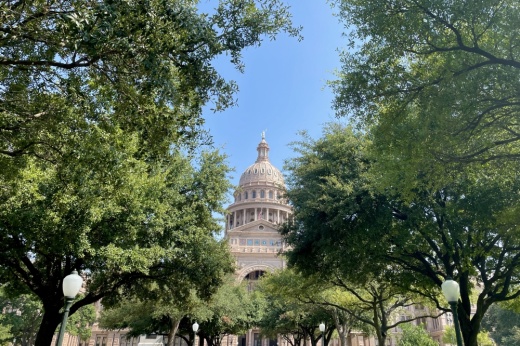Lawmakers have until the 60th day of the session—March 10—to file prospective pieces of legislation, but bills filed before the session opens often highlight their priorities for the biennium.
Bills are labeled numerically based on when they were filed, but the first few slots are set aside for the leaders of each chamber: House Speaker Dade Phelan and Lt. Gov. Dan Patrick. This year, Phelan reserved House bills 1-20, while Patrick will have Senate bills 1-30. Patrick revealed his legislative priorities Nov. 30 but has yet to file any bills.
Budgeting for the coming years
At a Nov. 30 meeting, the Legislative Budget Board voted unanimously to increase the Legislature’s spending ability by 12.33% for the 2024-25 budget. This means lawmakers will have access to up to $131 billion for the biennium.
Earlier this year, Comptroller Glenn Hegar revealed the state will have a surplus of roughly $27 billion, which puts the Legislature above its constitutional spending limits. To increase the spending cap, lawmakers must pass bills to increase the cap or vote to surpass it.
Lawmakers began laying out their objectives for the session Nov. 14, when bill filing opened. Below are some of the legislation that lawmakers are expected to debate when they return to Austin. This article is not comprehensive.
Education and public schools
Changing the way Texas funds public schools is top of mind for many educators, administrators and parents. Schools receive per-student funding from the state under the basic allotment. Funding is based on average daily attendance, or the number of students at school on average.
Average daily attendance is the sum of students present throughout the school year divided by the number of days that schools are required to be open, according to the Texas Education Agency.
Schools then earn $6,160 per student who meets the average daily attendance threshold. But when a student is frequently absent, their school loses money, even if the school’s day-to-day operations do not change.
District administrators told Community Impact they lost more money during the height of the COVID-19 pandemic due to lower attendance rates when children were sick, quarantining or learning remotely.
House Bill 31, filed by Rep. Gina Hinojosa, D-Austin, aims to help solve that problem. The bill would require the state to fund schools based on the average number of students enrolled during the academic year. This would protect districts from losing money when students miss school.
Sen. Nathan Johnson, D-Dallas, filed an identical bill in the Senate. Similar bills were proposed during the 2021 legislative session, but they did not gain traction in either chamber.
Johnson also filed Senate Bill 88, which would increase the basic allotment to $7,075. The bill calls for an increase in the allotment when inflation rises to keep pace with the cost of maintaining a school. Rep. Donna Howard, D-Austin, filed an identical bill in the House.
According to research by Education Week, Texas is behind the national average for per-student funding by over $4,000.
HB 37, filed by Rep. Mary González, D-El Paso, would establish a commission tasked with developing recommendations to improve public school assessment and accountability. Multiple bills aim to directly alter Texas’ assessment model, including HB 337, which would eliminate certain end-of-course assessment and graduation requirements, and HB 680, which would implement “growth-based” assessments that can be catered to students’ needs.
Rep. Tom Oliverson, R-Cypress, filed HB 338, which would require publishers to issue content ratings for all books and “written material” used in public and charter schools. The ratings would be based on a student’s age and the topics discussed, limiting who could access certain materials. There would also be an option for the state to recall books with incorrect ratings.
According to free-speech nonprofit PEN America, 801 books were banned across Texas from July 2021 through June 2022. That is more than any other state in the nation.
Property taxes
Texas has one of the highest property tax rates in the nation. This is because the state does not charge an income tax. Additionally, local property taxes are used to fund schools, city infrastructure, emergency services and more.
State leaders, including Gov. Greg Abbott, have indicated lowering property taxes is a top priority this session.
Multiple bills have been filed to eliminate or reduce schools’ maintenance and operations taxes, which fund day-to-day operations and employee salaries. Rep. Andrew Murr, R-Junction, filed two bills that would eliminate the tax.
HB 29 would create a joint committee that would deal with the details of eliminating the tax, while HB 38 would increase certain state taxes in place of the local property taxes.
Dick Lavine, the senior fiscal analyst for policy nonprofit Every Texan, said eliminating maintenance and operations taxes is “completely unrealistic” for Texas.
“If we want to keep having schools, you need another source of revenue,” Lavine said. “And the state does not have much in alternative sources.”
Homeowners can also receive homestead exemptions, or a reduction in a portion of a home’s value for tax purposes. According to the comptroller’s office, a $40,000 reduction is available for each homeowner’s primary residence. Additional exemptions are available for Texans who have a disability or are over age 65.
HB 40, filed by Rep. Erin Zwiener, D-Driftwood, would create a homestead exemption for property that is used to harvest rainwater or gray water. HB 144, filed by Rep. Diego Bernal, D-San Antonio, would create an exemption for the parent or legal guardian of someone who receives care in their home while waiting on state support.
Health and safety
Sen. Sarah Eckhardt, D-Austin, filed SB 207, which would legalize fentanyl testing strips. The strips are used to detect fentanyl, a deadly opioid, in various drugs and can help prevent overdoses. However, testing strips are considered drug paraphernalia, which is illegal in Texas.
Three representatives filed identical bills in the House. Abbott also launched a statewide anti-drug trafficking campaign, “One Pill Kills,” in October.
HB 56, filed by Rep. Evelina Ortega, D-El Paso, would extend postpartum Medicaid benefits for one year. Low-income Texans currently have two months of coverage after their baby is born.
In 2021, the House voted to extend Medicaid coverage to 12 months, but the Senate cut it to six months. The plan was not approved by the federal government. As of Oct. 27, over half of U.S. states provided Medicaid coverage for 12 months postpartum, according to the federal Department of Health & Human Services.
Abortions
Rep. James Talarico, D-Austin, filed House Joint Resolution 56. If passed, Texans would have the opportunity to vote on the state’s abortion law. Under HB 1280, which was passed in 2021, all abortions are illegal unless the life of the pregnant person is seriously in danger. State law does not include exceptions for rape or incest.
During an August primary election, Kansas residents voted against a ballot measure that would allow state lawmakers to limit or ban abortion. Kentucky voters rejected a similar proposal in November.
A group of Democratic lawmakers filed two bills aimed at expanding access to abortions in Texas. SB 122 would create an exception for rape in the state ban. Someone requesting an abortion would not be required to file a police report, submit evidence or prosecute a sexual assault case to get an abortion. SB 123 would allow doctors to perform abortions to save a patient’s life, to preserve their mental or physical health, or if a fetus has a lethal condition that would prevent the child from surviving outside the womb.
HB 61, filed by Rep. Candy Noble, R-Lucas, would prevent local governments from helping Texans pay for out-of-state abortions, including travel, lodging, counseling and more.
Gun ownership
Rep. Joe Moody, D-El Paso, filed HB 22, which would require the Texas Department of Public Safety to send reports to local law enforcement agencies when a person buys more than one gun or more than three magazines within a five-day period. Various news outlets reported that the gunman who killed 19 students and two teachers at Robb Elementary School in Uvalde bought two AR-15 rifles and at least 375 rounds of ammunition within a few days after his 18th birthday. He brought one of those rifles into the school, authorities said.
SB 145, filed by Sen. Roland Gutierrez, D-San Antonio, would raise the minimum age from 18 to 21 to purchase “any firearm, club, or location-restricted knife” in Texas.
Energy and natural resources
Nearly two years after Winter Storm Uri hit Texas in February 2021, lawmakers are filing more bills to strengthen Texas’ water and energy infrastructure. State energy officials have assured Texans that the power grid will withstand increased demand this winter, but some reforms have not yet been completed, and regulators are still working to find long-term solutions to certain issues.
Rep. Richard Peña Raymond, D-Laredo, filed HB 578, which would require state agencies to create a “comprehensive plan” to protect Texas’ oil and gas facilities from severe weather, natural disasters, power outages and security threats. He also filed HB 585, which would do the same for water treatment facilities.
Sen. Judith Zaffirini, D-Laredo, filed SB 31, which would allow power companies within Texas’ grid to connect to grids in and purchase power from areas outside the state. This would likely include the national power grid.
Zaffirini also filed SB 53, which would provide funding to help water and sewer companies purchase and build backup power generators in “economically distressed areas.”
The 88th Texas Legislature will convene Jan. 10.





